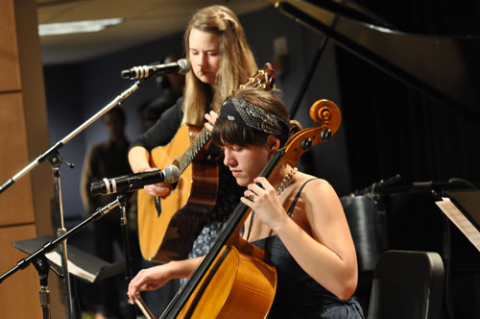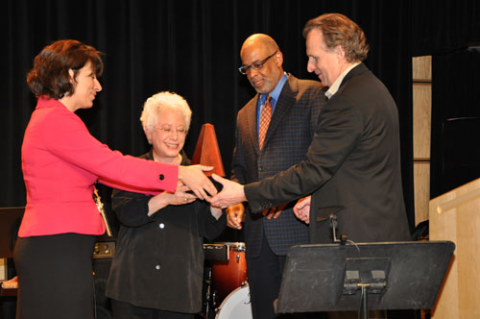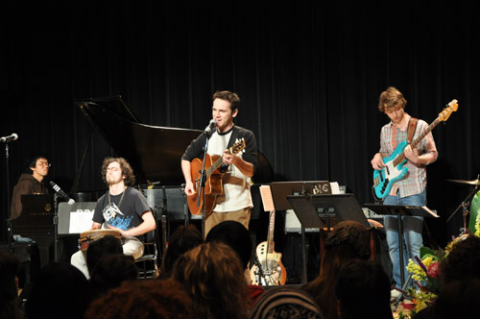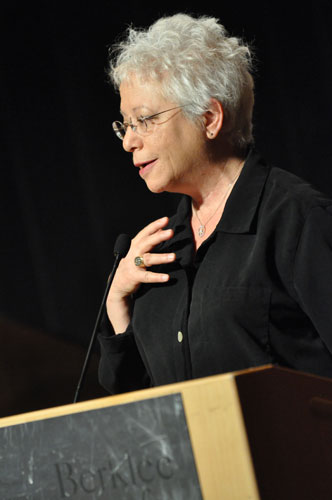Janis Ian: An Artist's Way

Janis Ian was an artist-in-residence and the keynote speaker for Berklee's annual Liberal Arts Symposium.
Photo by Phil Farnsworth

Monica De Vitry (foreground) performs "Different from the War," which won second place in the Songwriting Department's Songwriting and Social Change Contest.
Photo by Phil Farnsworth

Janis Ian performs at the Liberal Arts Symposium.
Photo by Phil Farnsworth

Camille Colatosti, chair of the Liberal Arts Department; Lawrence Simpson, senior vice president for academic affairs/provost; and Berklee President Roger H. Brown present Janis Ian with a Liberal Arts Tribute Award.
Photo by Phil Farnsworth

Robert Gillies (center) was the first place winner of the Songwriting and Social Change Contest.
Photo by Phil Farnsworth

Said Ian: "To be an artist is to occupy heaven and hell simultaneously. We’re born with our talent. We can nurture it, protect it, strengthen it, make it our own, but we cannot take full credit for it. The talent itself is a grace, a gift."
Photo by Phil Farnsworth

Meredith Hope and Jaret Hewitt earned third place for "Together We Stand."
Photo by Phil Farnsworth
For singer/songwriter Janis Ian, musicianship is an artistic calling. For Berklee musicians, her message surely resonated. "I believe in art. I believe in the power of art. I believe it can heal the broken in spirit, give strength to the fragile, ease the weary soul. I believe art offers us emancipation, and salvation—even from ourselves," said Ian, the writer of the oft-recorded song "Jesse," as well as the Grammy-nominated "At Seventeen," and author of the autobiography, Society's Child. The keynote speaker at Berklee's 16th Liberal Arts Symposium held in April, Ian talked about the power of art, humility, and the creative process.
The following are excerpts from Ian's talk.
On all the trappings of being an artist:
To be born an artist is to be born an outlaw, to be born with the possibility of attaining what Nietzsche refers to as "the aristocracy of merit," placing us above those who are merely aristocrats by birth, or by marriage. We are dangerous, we artists, because we accept nothing at face value, including our own worth. We question all systems, follow all problems to the source, and never stop searching... And the talent we bear is ephemeral. There is not an artist alive who can honestly tell you where their inspiration comes from, let alone why it strikes sometimes and disappears at others.
No singer can guarantee their voice will be at its best on any given night. No player can make that guarantee. In addition to the complex physical mechanisms we deal with—heat, humidity, fatigue—there are also the intangibles. Have I done too much business today, used up my concentration? Did I look in the mirror when I was changing and decide I hate my body? In the wrench of leaving, how much of my heart still remains at home, rather than where it belongs at this moment in time—here on the stage?
The biggest fear, of course, is that since our talent is so ephemeral, it will disappear. . . . It is because of this fear that we are such jealous guardians of our superstitions, our rules and regulations, our illusory ability to control the world around us.
On artists as commodities:
Make no mistake, we are commodities. We sell soap. Our only edge is to make our soap just a little bit more attractive to the buyer than the next fellow's.
It's easy, as a commodity, to become overwhelmed with the amount of people pressing you for decisions, impinging on your time. . . . We are surrounded by people who earn their livings through us. My U.S. booking agents, mildly interested in planning my career, but much more interested in paying their bills, would have me take every show they offer. My foreign booking agents can't understand why I don't want to spend a year or two abroad. My recording affiliates would have me spend most of my time in their territories, helping them sell CDs. My cowriters want me home to write more songs with them, my business managers want me to make as much money as possible so I'm secure in my old age, and my partner would just like to see me once in a while.
It is easy to become overwhelmed. That's when you start saying "No" to everything and everyone, because "No" feels like the only control you have over your life anymore. Or the only sense of control.
On humility:
As you grow, and go out into the world, remember that we, as commodities, are surrounded by people in whose interest it is to keep us childlike. Childish. Spoiled. Ignorant. To surround us with people who cater to our every whim, until eventually we are deceived into thinking we are somehow more important, more special, than everyone else—that, having done nothing to earn it, we still merit that kind of consideration.
In my own experience, these are rarely the great artists. Because a great artist knows he or she is great—and also knows that greatness demands humility. A great artist stands humbled before the scope of their own talent.
On the creative process:
When I'm in the middle of something creative—be it writing a song, giving a show, singing a vocal in the studio—I am as fully there as possible. Buddhists speak of "being in the moment." At those times, there is only that moment, that commitment, that piece of work. Nothing else matters.
The closest I can get to describing it politely, if you've never been there, is to say that it's like being on the back of a runaway horse, without saddle, reins, or bridle. There's the unbelievable exhilaration of the ride, watching the universe stream past at light speed, feeling the rise and fall of the flanks beneath your hips, having to pay 100 percent attention 100 percent of the time as you struggle desperately to stay on. Knowing that if you do manage to stay on the horse . . . when the ride is over, you'll feel like you've conquered the world.
That's how I would politely describe it. If I were among friends, I would just say, "It's better than the best sex you can imagine. Just as exhausting, and just as exciting."
On our charge as artists:
We make magic. We are alchemists of the soul. We take nothing, thin air, and we turn it into gold. We transmute the ordinary happenstance of life into gold, into diamonds, into emeralds—and make it visible. Here's a song about your life. Here's a painting of your world. Here's play, here's a vision, here's a moment to grab hold of and cherish.
Our great strength, and our great privilege, is to hold on to the dreams of those around us. To speak for the silent. To give voice to the voiceless. To grasp the longing, the yearning, of those who cannot do so for themselves. It is our job to seize their hopes and dreams, their triumphs and their failures—to grab them in our hands and hold their hearts safe.
This is alchemy at its best. To transform the hopes and fears of a world. . . . To hold a mirror up to their eyes, and let them see—not just who they think they are—but who they truly are. To offer them redemption, through the essence of truth.
That is what it is to be an artist, in its highest sense. To serve. To live in service to your gift.
